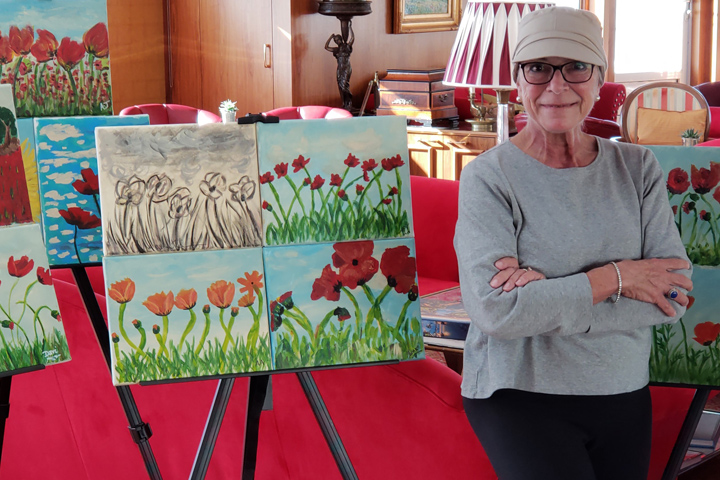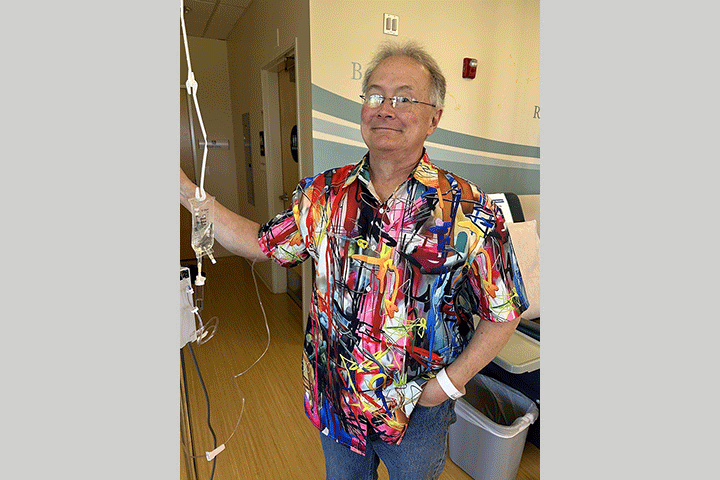My Pancreatic Cancer Clinical Trial Journey

- Testing for another surgery finds pancreatic cancer
- Traveling for diagnosis
- Genetic testing finds a BRCA2 mutation
- A clinical trial shrinks my tumors
In February 2018, I was diagnosed with stage IV adenocarcinoma, pancreatic cancer with metastases on my liver.
My story starts in September 2017. I decided to get checked for the status of fibroids in my uterus, and an ultrasound given as part of the exam showed an oddly shaped mass on one of my ovaries. My doctor recommended surgery, and the pre-op blood work included the CA 19-9 test. When I saw the results, I began to research what that meant and became very concerned. My primary care doctor was equally concerned and ordered a CT scan, which showed a mass on the pancreas.
It was not clear if the mass was cancerous, and I did not have any symptoms. After consulting a local oncologist and doing more research, I decided to go somewhere that had expertise in pancreatic cancer. I chose Memorial Sloan Kettering Cancer Center (New York), which I had researched and found to have a clear specialization in pancreatic cancer. I met with Dr. Peter Kingham, who said that my prognosis was one to two years if I had chemotherapy treatments, and recommended FOLFIRINOX.
Starting with Standard Treatment
I was biopsied at Sloan Kettering and the doctors encouraged me to have molecular profiling and germline seed testing done. I agreed and while awaiting those results, they suggested I have chemo treatments done locally at Medstar Georgetown’s Lombardi Cancer Center, with Dr. Michael Pishvaian (now at Johns Hopkins at Sibley Hospital, Washington, D.C.). Meanwhile, I called and spoke with a nurse navigator at MD Anderson who let me know they would also recommend beginning with FOLFIRINOX, and to call them again for second opinions on next steps or clinical trials.
I have the most amazing support network—I never went alone to any appointment and some friends have taken me more than once!
During this time, I plugged in with the Pancreatic Cancer Action Network and Let’s Win. I received lots of information from them, researched online, read NIH journal articles about pancreatic cancer and the Whipple procedure. I learned that because of the location and nature of my tumor on the pancreas (uncinate process and wrapped 180 degrees around the superior mesenteric artery), I am not even a “borderline resectable” candidate. Though there are surgeons out there who might be willing to try it, my odds of survival and quality of life afterward would be poor.
I started the FOLFIRINOX treatments. I found the side effects somewhat manageable with the drugs the doctors provided to counteract them. And, because of my otherwise good health, I handled the chemo better than some folks. Despite the fatigue and other side effects, I was able to take four European river cruises I had planned for that year in between infusions. While I was undergoing chemo, the results of the profiling came in—the germline tests were negative, but the profiling of my liver metastases came back with, among others, the BRCA2 tumor mutation. I never expected BRCA anything to be great news, but the Sloan Kettering oncologist said it opened the door for me to get precision medicine for my cancer.
Genetic Testing Leads to a Clinical Trial
Dr. Pishvaian, an accomplished pancreatic cancer researcher and practitioner, had wanted me to consider clinical trials the minute I walked in the door. By my eighth infusion appointment I had my genetic testing results, so we knew I carry the BRCA2 mutation, and he wanted me off the chemo and in a trial. Dr. Pishvaian recommended two trials, one of which was the trial I am currently in. I had also been researching, friends were researching for me, and PanCAN searched and returned with 22 possible trials within geographic parameters I provided. By triangulating information from all these sources, I decided on the rucaparib trial at the University of Pennsylvania’s Abramson Cancer Center, under the leadership of Dr. Kim Reiss Binder. This was a phase II trial (my preference) targeted to stage IV pancreatic cancer patients who had responded positively to platinum-based chemotherapy for at least eight cycles and had the BRCA1/2 tumor mutation. There could not be a better fit, in my mind.
I began the rucaparib trial medicine August 3, 2018. Within a month my CA 19-9 results went into the normal range. While my hair began to grow back, and my energy levels began to return, I experienced very virulent nausea, vomiting, diarrhea in the first three to four months of this treatment. Dr. Reiss Binder encouraged me to take Compazine and Imodium to combat the side effects, and to hang in just a little while longer. She, too, is a brilliant doctor and scientist, and I am so fortunate to have found her.
The side effects tapered off and I began gaining weight and becoming as active as I was before this journey started. The drug company is supplying the medicine for free and apparently will do so for patients in the trial even after it closes, as long as it works for them. The trial requires that I travel to Philadelphia once a month. I take Amtrak with friends for my appointments and enjoy a wonderful French lunch on Rittenhouse Square before returning home to northern Virginia.
Living With Pancreatic Cancer
In January 2019, an MRI showed the metastases on my liver had all but disappeared and could no longer be measured, and my CT scans to date have shown no new metastases and the main tumor has remained stable. I am now 65 years old and a very healthy stage IV pancreatic cancer patient.
Although I am not eligible for surgery, and not sure if the trial meds will continue to work for years, nothing has deterred my eternal hope or lessened my endless gratitude for the doctors and scientists who are determined to take on and overcome this horrible challenge of pancreatic cancer. Dr. Pishvaian has backup plans if the cancer becomes resistant to the rucaparib. This is my new normal! And every day I am just glad to be here!
I recommend that folks who are diagnosed join PanCAN and follow Let’s Win; read all you can about this cancer and clinical trials; find the best specialized oncologists, listen to them but also question them; decide for yourself the right course of action regarding treatments and clinical trials—it is your body and your choice; and plan ahead many wonderful events so you have much to look forward to.
To read more details of my story or to contact me, please read my blog Davi’s Pancreatic Cancer Journey.
Watch Davi tell her story in “Steely Strength to Keep Going.”





